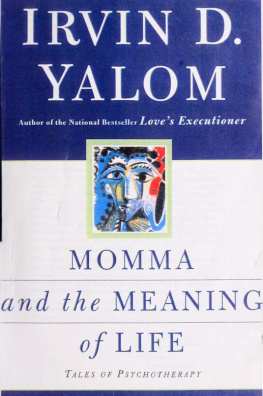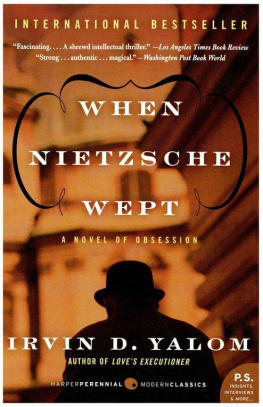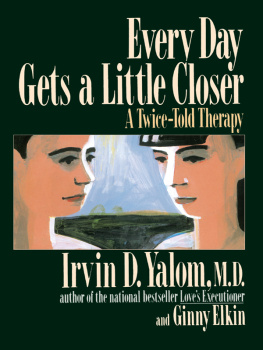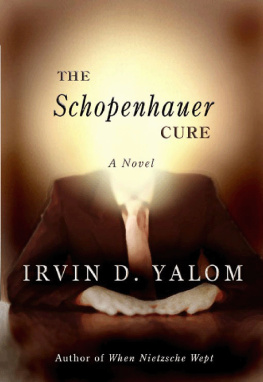Creatures of a Day
Also by Irvin D. Yalom
The Spinoza Problem
Staring at the Sun
Im Calling the Police (co-authored with Robert Berger Brent)
The Schopenhauer Cure
Momma and the Meaning of Life
The Gift of Therapy
The Yalom Reader
Lying on the Couch
When Nietzsche Wept
Loves Executioner
Inpatient Group Psychotherapy
Existential Psychotherapy
Every Day Gets a Little Closer
The Theory and Practice of Group Psychotherapy
Creatures of a Day
And Other Tales of Psychotherapy
Irvin D. Yalom

A Member of the Perseus Books Group
New York
Copyright 2015 by Irvin D. Yalom
Published by Basic Books,
A Member of the Perseus Books Group
All rights reserved. Printed in the United States of America. No part of this book may be reproduced in any manner whatsoever without written permission except in the case of brief quotations embodied in critical articles and reviews. For information, address Basic Books, 250 West 57th Street, New York, NY 10107.
Books published by Basic Books are available at special discounts for bulk purchases in the United States by corporations, institutions, and other organizations. For more information, please contact the Special Markets Department at the Perseus Books Group, 2300 Chestnut Street, Suite 200, Philadelphia, PA 19103, or call (800) 810-4145, ext. 5000, or e-mail special.markets@perseusbooks.com.
Library of Congress Cataloging-in-Publication Data
Yalom, Irvin D., 1931
Creatures of a day : and other tales of psychotherapy / Irvin D. Yalom Basic Books.
pages cm
ISBN 978-0-465-04051-3 (e-book)
1. PsychotherapyCase studies. 2. Psychotherapist and patientCase studies. I. Title.
RC480.5.Y33 2014
616.8914dc23
2014035737
10 9 8 7 6 5 4 3 2 1
To Marilyn,
my wife of sixty years, yet not long enough
Contents
All of us are creatures of a day; the rememberer and the remembered alike. All is ephemeralboth memory and the object of memory. The time is at hand when you will have forgotten everything; and the time is at hand when all will have forgotten you. Always reflect that soon you will be no one, and nowhere.
Marcus Aurelius, The Meditations
The Crooked Cure
Dr. Yalom, I would like a consultation. Ive read your novel, When Nietzsche Wept , and wonder if youd be willing to see a fellow writer with a writing block.
Paul Andrews
N o doubt Paul Andrews sought to pique my interest with his email. And he succeeded: Id never turn away a fellow writer. As for the writing block, I feel blessed by not having been visited by one of those creatures and I was keen to help him tackle it. Ten days later Paul arrived for his appointment. I was startled by his appearance. For some reason I had expected a frisky, tormented, middle-aged writer, yet entering my office was a wizened old man, so stooped over that he appeared to be scrutinizing the floor. As he inched slowly through my doorway, I wondered how he had possibly made it to my office at the top of Russian Hill. Almost able to hear his joints creaking, I took his heavy battered briefcase, held his arm, and guided him to his chair.
Thankee, thankee, young man. And how old are you?
Eighty years old, I answered.
Ahhh, to be eighty again.
And you? How many years do you have?
Eighty-four. Yes, thats right, eighty-four . I know that startles you. Most folks guess Im in my thirties.
I took a good look at him, and for a moment our gazes locked. I felt charmed by his elfish eyes and the wisp of a smile playing on his lips. As we sat in silence for a few moments looking at one another, I imagined we basked in a glow of elder comradeship, as though we were travelers on a ship who, one cold foggy night, fell into conversation on the deck and discovered we had grown up in the same neighborhood. We instantly knew one another: our parents had suffered through the Great Depression, we had witnessed those legendary duels between DiMaggio and Ted Williams, and remembered rationing cards for butter and gasoline, and VE day, and Steinbecks Grapes of Wrath , and Farrells Studs Lonigan. No need to speak of any of this: we shared it all, and our bond felt secure. Now it was time to get to work.
So Paul, if we may use first names
He nodded. Of course.
All I know about you comes from your short email. You wrote that you were a fellow writer, youve read my Nietzsche novel, and you have a writing block.
Yes, and Im requesting a single consultation. Thats all. Im on a fixed income and cant afford more.
Ill do what I can. Lets start immediately and be as efficient as possible. Tell me what I should know about the block.
If its all right with you, Ill give you some personal history.
Thats fine.
I have to go back to my grad school days. I was in philosophy at Princeton writing my doctorate on the incompatibility between Nietzsches ideas on determinism and his espousal of self-transformation. But I couldnt finish. I kept getting distracted by such things as Nietzsches extraordinary correspondence, especially by his letters to his friends and fellow writers like Strindberg. Gradually I lost interest altogether in his philosophy and valued him more as an artist. I came to regard Nietzsche as a poet with the most powerful voice in history, a voice so majestic that it eclipsed his ideas, and soon there was nothing for me to do but to switch departments and do my doctorate in literature rather than philosophy. The years went by, my research progressed well, but I simply could not write. Finally I arrived at the position that it was only through art that an artist could be illuminated, and I abandoned the dissertation project entirely and decided instead to write a novel on Nietzsche. But the writing block was neither fooled nor deterred by my changing projects. It remained as powerful and unmovable as a granite mountain. No progress was possible. And so it has continued until this very day.
I was stunned. Paul was eighty-four now. He must have begun working on his dissertation in his mid-twenties, sixty years ago . I had heard of professional students before, but sixty years? His life on hold for sixty years? No, I hoped not. It couldnt be.
Paul, fill me in about your life since those college days.
Not much to tell. Of course the university eventually decided I had stayed overtime, rang the bell, and terminated my student status. But books were in my blood, and I never strayed far from them. I took a job as a librarian at a state university, where I stayed put until retirement trying, unsuccessfully, to write all these years. Thats it. Thats my life. Period.
Tell me more. Your family? The people in your life?
Paul seemed impatient and spat his words out quickly: No siblings. Married twice. Divorced twice. Mercifully short marriages. No children, thank God.
This is getting very odd, I thought. So affable at first, Paul now seems intent on giving me as little information as possible. Whats going on?
I persevered. Your plan was to write a novel about Nietz sche, and your email mentioned that you had read my novel When Nietzsche Wept. Can you say some more about that?
I dont understand your question.
What feelings did you have about my novel?
A bit slow-going at first, but it gathered steam. Despite the stilted language and the stylized, improbable dialogue, it was, overall, not an unengrossing read.
No, no, what I meant was your reaction to that novel appearing while you, yourself, were striving to write a novel about Nietzsche. Some feelings about that must have arisen.
Next page






